苏教版初三(上学期)牛津英语9A+Unit6+TV+programmes_PPT课件
九年级英语上册 Unit 6 TV programmes Task教案 (新版)牛津版-(新版)牛津
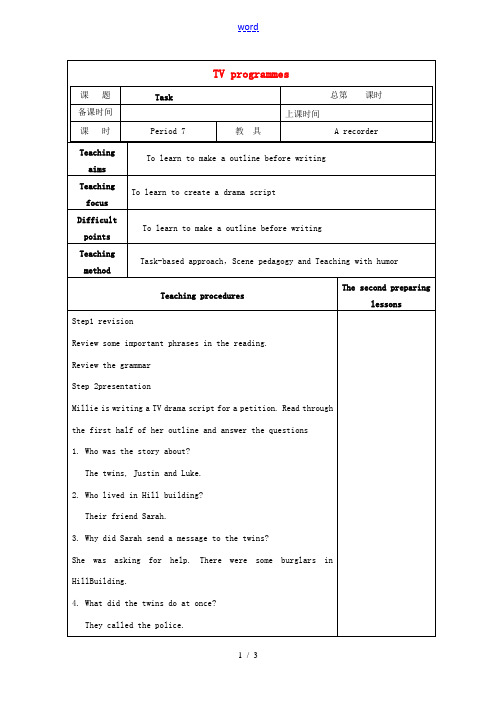
They called the police.
5. What did the twins see?
They saw three men in police uniforms ing out of the building with guns in their hands.
Step1 revision
Review some important phrases in the reading.
Review the grammar
Step2presentation
Millie is writing a TV drama script for a petition. Read through the first half of her outline and answer the questions
1. Who was the story about?
The twins, Justin and Luke.
2. Who lived in Hill building?
Their friend Sarah.
3. Why did Sarah send a message to the twins?
She was asking for help. There were some burglars inHillBuilding.
6. What happened to the twins?
They were pushed into a minibus, but they tried to use a knife to open the back door of the minibus.
九年级英语上册《Unit 6 TV programmes Integrated skills》教案 (新版)牛津版

Unit6 TV programmesIntegrated skillsTeaching goals:1.知识与技能: 进一步认识和掌握与电视节目相关的词汇、词组。
2.过程与方法: 通过分析所给材料获取重要信息并能够在阅读已有的信息后预测未知信息。
通过听录音获取新信息,并能通过合理猜测完成听力练习。
3.情感、态度与价值观: 学会表达喜欢和不喜欢,并说明原因。
Important and difficult points:用已获取的材料的关键词汇和信息来完成报告Teaching procedures:.任务一:Presentation1. Today we’re going to talk about TV viewing habits. Then ask:What TV programmes do you like or dislike?What’s your favourite programme? Why?How much time do you spend watching TV every week?2. Say: Would you like to know the TV viewing habits of some students at SUNshine MiddleSchool? M illie wants to interview three students about their TV viewing habits.Before the interviews, she has written down what she knew about the students. Let’s read the information in Part A1 and help the students to guess their favorite TV programme(s).favorite TV program me(s)任务二:听力。
9A-Unit6-TV-programmes
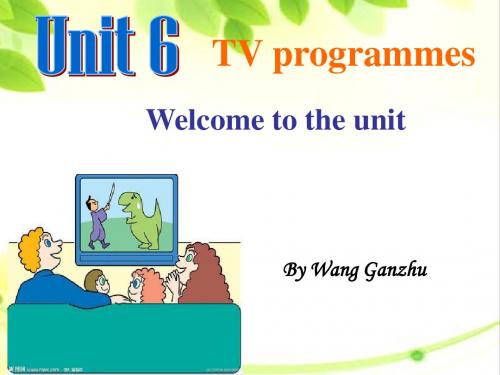
Can you match?
Let’s talk about our own favourite TV programmes.
A: What type of TV programmes do you like? B: I like watching…because…. C: I prefer… D: I think... ...
It is very funny. It usually has a happy ending.
cartoon
cooking
fashion
films
music video
animals & nature
news
sports
travel
Different types of TV programmes
playing 3.She is getting bored with ________(play) the piano. 4.Students’ homework is never _______(do). done 5.He is a famous ______ actor (act) and acted in a called (call) Happy Family. drama _______
documentary 纪录片
documentaries
We can learn a lot about nature, history and real-life events from them
game show
If you win, you will get a great prize.
comedy喜剧片 comedies
comedy
game show
牛津译林版英语九上Unit 6《TV programmes》(Integrated skills)教

牛津译林版英语九上Unit 6《TV programmes》(Integrated skills)教学设计一. 教材分析《牛津译林版英语九上Unit 6 TV programmes》主要介绍了不同类型的电视节目。
本节课的主题与学生的生活紧密相连,有助于激发他们的学习兴趣。
教材包括不同类型的电视节目,如新闻、综艺节目、纪录片等,以及与电视节目相关的话题,如电视节目对人们的影响、如何选择电视节目等。
通过对这些话题的学习,学生可以提高自己的英语听说读写能力,同时培养自己的审美观和批判思维能力。
二. 学情分析学生在之前的学习中已经掌握了一定的英语基础,能够进行简单的英语交流。
但部分学生对于某些电视节目的类型和特点可能了解不多,因此在教学过程中需要引导学生进行观察、思考和讨论。
此外,学生可能对英语学习存在一定的焦虑情绪,需要教师在教学中给予鼓励和关爱,激发他们的学习兴趣。
三. 教学目标1.知识目标:学生能够掌握不同类型的电视节目以及与电视节目相关的话题。
2.能力目标:学生能够用英语介绍自己喜欢的电视节目,并表达自己的看法。
3.情感目标:培养学生对电视节目的审美观和批判思维能力,提高他们对英语学习的兴趣。
四. 教学重难点1.重点:学生能够用英语介绍不同类型的电视节目。
2.难点:学生能够表达自己对电视节目的看法,并进行批判性思考。
五. 教学方法1.任务型教学法:通过完成各种任务,激发学生的学习兴趣,培养他们的实践能力。
2.交际型教学法:通过小组讨论、角色扮演等活动,提高学生的英语交际能力。
3.情境教学法:创设真实的语境,帮助学生更好地理解和运用英语。
六. 教学准备1.教师准备:提前准备好相关电视节目的素材,如视频、图片等。
2.学生准备:学生预习课文,了解不同类型的电视节目。
七. 教学过程1.导入(5分钟)教师通过提问方式引导学生谈论他们喜欢的电视节目,激发学生的学习兴趣。
2.呈现(10分钟)教师展示不同类型的电视节目素材,如新闻、综艺节目、纪录片等,引导学生观察并说出它们的特点。
江苏新教材牛津英语九年级上 Unit 6 TV Programmes教案

2014-2015 学年度第一学期九年级英语学科集体备课教案 主备人:曹桂兰
敬业 求真
审核人:
课题 课时 教 学 目标 教 学 重点 教 学 难点 教 学 媒体 教 学 过程
Unit 6 TV programmes Welcome to the unit
第一课时 执教时间 复备人 1. 知识目标:了解与电视节目相关的词汇; 了解电视节目的分类。 2.技能目标:学会用英语谈论喜欢或者不喜欢的电视节目类型并说出理由。 3.情感目标:学会怎样从压力中释放出来。 知识目标+技能目标 学会用英语谈论喜欢或者不喜欢的电视节目类型并说出理由。 录影机,多媒体,实物等 Step1:预习指导与检测 见导学案 Step2:展示目标 见导学案 Step3:课堂导学与互动 任务一:Free talk 1. Do you like watching TV? 2. How often do you watch TV? 3. How long do you watch TV every day? 任务二:Welcome to the unit 学习 A 部分。 1、讨论: What types of TV programmes do you know? 2、根据课文第 79 页内容,回答问题。 1). Who play the roles in a drama? 2). Where is CCTV News made in? 3). How can we see the programmes? 4). How are the programmes sent? 5). What do you need when you want to change the channel? 3、独立完成课本第 79 页 A 部分的练习,全班核对答案。 Say: Let’s look at these pictures. Each picture represents a scene of a TV programme. Sandy is trying to match the scenes with the correct types of TV programmes. Can you help her? 学习 B 部分。 1、Listen and answer: Say: Sandy and her friends are talking about their favourite TV programmes. Let’s listen to their conversation and find out who likes game show. 1) What type of TV programmes does Millie like? 2) Why does Millie like watching documentaries? 3) What does Amy think of chat shows? 4) Who loves cartoons? 2、将学生分成五人小组分角色朗读对话,组内就每个学生各自喜欢的电视节目进行询
九年级英语上册Unit6TVprogrammesTask教案(新版)牛津版

Unit 6 TV programmesTaskI. Teaching aims and learning objectivesBy the end of the lesson, students should be able to:1.learn to make an outline before writing;2.learn to create a simple TV drama script.II. Teaching contents1. New words and phrases: gun, twin, burglar, receive a message, ask for help, callthe police, three men in police uniforms, with guns in theirhands, be pushed into a minibus, open the back door of ...2. New structure: The twins saw three men in police uniforms coming out of thebuilding with guns in their hands.III. Focus of the lesson and predicted area of difficultyTeach the students how to create a TV drama script.IV. Teaching proceduresStep 1 Lead-inT: Do you like watching drama series? Have you watched this drama series Modern Family?What do you think of it?S: It is exciting/interesting/humorous ...T: Do you know this man? He is good at writing stories. He wrote the TV drama script for Modern Family. Because of his good writing, we can enjoy such exciting drama series.【设计意图:通过电视剧引出编剧,让学生对于本课的写作任务有了初步的认识。
牛津译林版英语九年级上册 Unit 6 《TV programmes.》 教学设计2

牛津译林版英语九年级上册 Unit 6 《TV programmes.》教学设计2一. 教材分析牛津译林版英语九年级上册Unit 6《TV programmes》主要介绍了不同类型的电视节目。
本课内容贴近学生生活,易于引起学生的兴趣。
通过学习本课,学生能够掌握描述电视节目的词汇和表达方式,提高听说读写能力。
教材内容由五个部分组成,包括听力、阅读、口语、写作和语法。
二. 学情分析九年级的学生已经具备了一定的英语基础,对于日常生活中的话题有较高的兴趣。
但部分学生可能在听说方面存在一定的困难,需要教师在教学中给予关注和指导。
此外,学生对于不同类型的电视节目有自己独特的喜好,可以借助这一特点激发学生的学习兴趣。
三. 教学目标1.知识目标:学生能够掌握描述电视节目的词汇和表达方式,提高听说读写能力。
2.能力目标:学生能够运用所学知识进行日常交流,提高语言运用能力。
3.情感目标:培养学生对不同类型电视节目的兴趣,引导学生合理观看电视节目。
四. 教学重难点1.重点:学生能够掌握描述电视节目的词汇和表达方式。
2.难点:学生能够运用所学知识进行日常交流,提高语言运用能力。
五. 教学方法1.任务型教学法:通过完成各种任务,激发学生的学习兴趣,提高学生的参与度。
2.交际型教学法:创设真实的交际情境,培养学生的人文素养和实际交际能力。
3.情境教学法:通过展示图片、视频等,创设直观生动的教学情境,帮助学生理解和学习。
六. 教学准备1.教师准备:提前准备好教学PPT、视频、音频等教学资源。
2.学生准备:学生提前预习教材,了解本课内容。
七. 教学过程1.导入(5分钟)利用多媒体展示不同类型的电视节目图片,引导学生谈论自己喜欢的电视节目。
教师通过提问,了解学生对电视节目的认识和喜好,为新课的学习营造轻松愉快的学习氛围。
2.呈现(10分钟)教师通过PPT展示本课的生词和短语,如cartoon、news report、variety show等,引导学生跟读并翻译。
9A Unit 6 TV programmes Comic strip and Welcome to the unit教学设计

《9A Unit 6 TV programmes Comic strip and Welcome to the unit》教学设计Learning aims:1.To learn some words abut TV programmes.2.To know about the types of TV programmes.3.To learn how to talk about one’s favourite type of TV programmes. Important points:To kno w how to talk about one’s favourite type of TV programmes with the words in this period and to be able to tell the reasons.Learning preparation:1.Preview the new words.2.Listen to the tape and read the two dialogues of this period. Learning process:Task 1 Free talk1.What do you usually do at weekends?2.Do you like watching TV?3.How long do you watch TV every day?4.Do you know the types of TV programmes?Task 2 Present six types of TV programmes.Complete Part A and check out the answers.Task 3 Present more types of TV programmes.Among these types of TV programmes, which one is yourfavourite?Ask and answer.Task 4 Listen to Part B and answer the questions.Task 5 Discuss your favourite TV programmes with your partners. Task 6 Listen to the comic strip and answer questions.Task 7 PracticeTask 8 Homework。
苏教牛津译林版初中英语九年级上册 Unit 6 TV programmes Period 当堂训练

苏教牛津译林初中英语重点知识精选掌握英语语法知识,巩固词汇量和各种语态,学好英语基础一定要扎实,大家一起练习吧!牛津译林初中英语和你一起共同进步学业有成!Unit 6 TV programmes一、词组翻译。
1.无事可做 ______________________________ 2.参加 ___________________________3.和……一样精彩 _________________________ 4.赢得一个大奖 _________________________5.访谈节目 _____________________ 6.对做某事感到无聊 ______________________二、词汇运用。
1.We can learn a lot about _______________ (真实生活的)eve nt from documentaries.. 2.There is a book ________________ (write)by Lu Xun on the desk.3.I hope ________________ (看)you and your family soon.4.Woul d you like _________________ (walk)or shall we go by bus?.5.I have seen many ________________(动画片)about the wild animals?6.Many old men prefer ________________ (live)in a peaceful countryside?三、翻译句子。
1.总会有一些名人出现在这些节目中来谈论他们的生活。
___________________________________________________2.有个女孩正在房间照顾我。
___________________________________________________3.我们有些人想参加慈善表演。
Unit 6 TV programmes-【教材同步拓展阅读】九年级英语上册

2022-2023学年九年级英语上册单元话题拓展阅读Unit 6 TV programmes一、任务型阅读阅读下面短文, 并用英语回答问题(请注意每小题后面的词数要求)。
Bring life to national treasures by singingAt the beginning of 2018, a TV programme called National Treasure introducing valuable cultural relics(文物) of our country went popular. People learnt stories and had more interest in the treasures. Now, we have a new way to know more about the ancient paintings in the Palace Museum through music.Tencent's QQ Music and the Palace Museum together held a songwriting competition, Ancient Paintings Can Sing(古画会唱歌).The competition was open to songwriters between 17 to 35, and the songs must be based on ten ancient paintings at the Palace Museum. The winners could sing their works with pop singers at a concert held at the Palace Museum in October.Yi Yangqianxi, a member of the famous group TFBOYS, sang the theme song, Magnificent Landscape in Painting (《丹青千里》), for the competition. The idea of the song came from the famous painting A Panorama of Rivers and Mountains(《千里江山图》). It was shown in the TV programme and now it's in the Palace Museum.The writer, Fang Wenshan, wrote the lyrics(歌词) of the song. He is famous for using cultural images in the lyrics. And the music is a modern style, including traditional Chinese musical instruments, such as guzheng and pipa.The music video of the song came out online on 25 July, 2018, which was also the beginning of the competition.Hou Deyang from the Tencent Music said that this competition could encourage young Chinese musicians to make more works and catch young people's attention to traditional Chinese art forms.(1)How can people learn more about the ancient paintings in the Palace Museum according to the passage? (不超过5个词)______________________________________________________________(2)Who could take part in the competition? (不超过5个词)______________________________________________________________(3)What is Fang Wenshan famous for? (不超过10个词)______________________________________________________________二、完形填空Most kids fall into the world of TV long before they enter school. 70% of the child care centres use (1)every day.The TV, as a modern invention, can be a (2)thing. Students can learn about (3)on nature shows, and parents can keep up with (4)events on the evening news. No doubt about it—TV can be an excellent educator and entertainer. (5)too much TV can be harmful. A recent survey shows that kids in the United States watch about 4 hours of TV a day. Scientists suggest that kids older than 2 should watch (6) 2 hours of TV a day. If kids spend more than 4 hours per day watching TV, they are more likely to be overweight. If kids view violent events, such as (7)and killing on TV, they are also more likely to believe that the world is not safe and that something bad will (8)them.And, according to scientists, kids (9)age 2 should have no 'screen time'(TV, DVDs, videotapes, computers or video games) at all. The first 2 years is a very important time for children's brain to develop. Watching TV may (10)their exploring and learning abilities.(1)A.TV B.computers C.radios D.MP3 players (2)A.bad B.good C.common D.different(3)A.Maths B.languages C.wildlife D.China(4)A.the oldest B.the farthestC.the most special D.the latest(5)A.Or B.But C.And D.As(6)A.no more than B.more than C.no less than D.over(7)A.fighting B.running C.playing D.chatting(8)A.go on B.look for C.happen to D.look after (9)A.older B.under C.above D.younger(10)A.effect B.correct C.collect D.affect三、阅读理解AMany people think that TV programs have little or no educational value (教育意义). It is true that lots of programs are meaningless. However, some programs are good and we learn many things from them. Here are few of my favorite programs.(1)How often did the writer watch Blue Peter when he was a child?A.Three times a week.B.Twice a week.C.Three times a month.D.Twice a month.(2)What does the underlined word "recipes" mean in Chinese?A.请柬B.协议C.餐券D.食谱(3)If Sarah is interested in animals, which of the following shows may she be interested in?A.Blue Peter.B.The Great British Bake Off.C.Frozen Planet.D.Pointless.(4)Which of the following is TRUE according to the material?A.Pointless is a quiz about sports.B.Blue Peter tells about different countries around the world.C.The writer always watches The Great British Bake Off online.D.The writer likes Frozen Planet because of the lovely animals in it.(5)The material mainly talks about ________.A.movies B.magazines C.TV programs D.talent showsBTV has become one important part of modern life. People enjoy themselves after hard work by watching TV. They can see some plays, some stories, some sports matches without going out of home, and without spending much money in buying tickets. TV programmes make people's life more interesting.People learn much from TV. Students can study by watching some educational programmes. People can see news, weather reports, programmes about science and computers.But not all the programmes are good enough. Today, there are some programmes about crime. Some people become bad because they learn from the bad people in those programmes. And watching TV usually takes too much time. It's not good for people's work and study. It's not good for their eyes either.Is watching TV a good thing or a bad one? I think it depends on people themselves. If one can choose good programmes and he doesn't spend too much time on TV, it can be a good thing for him.(1)If we don't go out of home, how can we see some football matches according to the passage?A.By listening to the radio.B.By buying some tickets.C.By watching TV.D.By being a fan.(2)What can we see on TV?A.Some plays and stories.B.Some educational programmes.C.News and weather reports.D.All of the above.(3)What does the underlined word “crime” mean in Chinese?A.文艺演出B.教育活动C.犯罪活动D.科学研究CAre you a TV lover? Can you imagine living without TV? Well, you could give it a try.A group of Americans from TV-Turnoff Network(网络) have an idea. From 19 to 25 April, they are asking children all over the world to turn off their TVs for one week. They hope children will find more interesting things to do. Maybe they can read some books, or learn to swim, or paint a picture. Since 1995, about 24 million people in America have taken part in TV-Turnoff week.TV-Turnoff Network says watching TV too much can bring children big problems with school, health and family. They want kids to watch less TV. What do you think?Bad for children's studiesAmerican scientists did a study of 1, 300 children. They watched the children for four years. They say that if children watch lots of TV, they don't do well in school.Bad for children's healthStudies show that when children watch lots of TV, they eat more unhealthy food. More children are getting overweight. Overweight children become ill more easily. Watching too much TV is also bad for their eyes.Bad for family lifeAbout 40% of American families watch TV at dinner time. That means that they don't talk very much when they eat together.Also, too many violent(暴力的) thingsAn American study says that before a child turns 18 years old, that child will see 200, 000 violent things on TV. Some kids become violent in real life.If you want to learn more about this unusual week, you can go to this website, www. tvturnoff. org.(1)When is TV-Turnoff week?A.From 19 April to 25 April.B.Any week in April.C.The first week in April.D.It doesn't tell us.(2)What do children do during that week?A.They watch TV much less.B.They go to this website, www. tvturnoff. org.C.They read some books, or learn to swim, or paint a picture.D.Both A and(3)What can we learn from the passage?A.About three fifths of American families watch TV when they have dinner.B.The children who watch too much TV will do well in school.C.Children in America aren't allowed to see violent things on TV until they are 18.D.Millions of people in America have taken part in TV-Turnoff week since 1995.DNowadays, phone calls and messages help us get in touch with others. It means that we seldom write letters now. But a TV show, Letters Alive(《见字如面》), is bringing back this old habit.Letters Alive invites famous actors and actresses, but there are no funny jokes or competitions. It's just one person walking up to a microphone and reading a letter. The letters were written by people from different times in history. For example, in one period, they read a letter written by famous writer Xiao Hong to her younger brother in 1941. The letter shows that Xiao Hong missed her brother so much and had great hopes for his future.“Every letter opens another world for us, ” according to Guan Zhengwen, the director of the TV show. “We can also touch the heart of the writers'. ” Since its first period on December 5, LettersAlive has been widely praised. Many audiences said that it had provided a breath of fresh air to today's TV shows.Besides Letters Alive, some other cultural TV shows have also been well received by Chinese audience. Chinese Poetry Conference is a traditional Chinese poetry competition. And Readers invites people to read poems and articles they like or wrote. It suggests that cultural values and true feelings are becoming our interest.(1)Letters Alive, a TV show, invites famous people to_________A.tell audiences jokes B.read and share lettersC.walk up to a microphone to sing D.take part in different competitions(2)How many cultural TV shows are there in the passage?A.One.B.Two.C.Three.D.Four.(3)Chinese audiences________these cultural TV shows.A.like B.dislikeC.show no interest in D.doubt about(4)Which is the best title for the passage?A.Phones have taken the place of lettersB.Welcome to our cultural TV showsC.Letters make us communicateD.Cultural TV shows are becoming popularECould you live without a TV for one year?What would you do with all that spare time?Philippa Carling wanted to see if it was possible and persuaded(说服) her family to give theirs up for one whole year.“I live with my husband and our two children, ” explains Philippa, “and I realized just how much time we spent sitting in front of the TV. The children turned it on first thing in the morning and again when they got back from school. My husband and I were no better. We'd spend the evening together talking about very little but what programme was on at that time. Then the family decided, after lots of arguments (争论), that we would try to do without a TV for one year. We nagged(唠叨) on the Internet and everyone was allowed to watch some of the recorded programmes—if they had a good reason for doing so. ” And so, on 24 July last year, the Carling family sold their TV.Eleven months have now gone by and Philippa believes the experiment(实验) has own a great success. As she explains, “We were all surprised at how easy it was. The immediate result was we all started to read a lot more, including the children. We spend time together after dinner playing board games around the table and the children finish their homework a lot quicker than before. We talk about what will happen when the year comes to an end and the children have always said they want the TV back. Butthey've also agreed that life has been good without it. ”So will the TV return when the year comes to an end next month?“We're not sure, ” says Philippa. “We might decide to buy a new one or we might not. The important thing is that we've all learnt life can carry on without one. It can even be fun!”(1)What is the writer trying to do in this passage?A.To warn parents about the dangers of TV.B.To argue that TV programmes are boring.C.To explain how a family lived without a TV.D.To persuade readers to give up their TVs for a year.(2)What do we learn about Philippa's family?A.Their TV was on all day long.B.They all agreed to try the experiment.C.She and her husband didn't watch much TV.D.They argued about which programmes to watch.(3)The family used the Internet .A.to watch recorded TV programmesB.to find good reasons for not having a TVC.to find out which programmes they were missingD.to chat with others who were doing the same experimentFMore than 95 percent of people in the world have phones today, according to the United Nations, Phone calls and messages help us easily communicate with others, It means that we seldom write letters now. But a TV show, Letters Alive, is bringing back this old habit.Letters Alive got its idea from a UK program with a similar name. Both shows invite famous actors and actresses, but there are no funny or different competitions, it's person walking up to a microphone and reading a letter.The letters were written by people from different times in history. For example , in one episode(集)they read a letter written by famous writer Xiao Hong to her younger brother in 1941.The letter shows that Xiao Hong missed her brother so much and had great hopes for his future" Every letter opens another world for us , " according to Guan Zhengwen, the director of the TV show. "It seems that we can experience the real lives and feelings of the writers,"Since its first episode on the fifth of December, Letters Alive has been widely praised. Many audience(观众)members said that it had provided a breath of fresh air to today's TV shows. Apart from(除了……之外)Letters Alive, some other cultural TV shows have also been well received by Chinese audiences. They include Chinese Poetry Conference(《中国诗词大会》),a classical Chinese poetry competition , and Readers , a program that invites people to read poems and articles they like or wrote."This means that our audiences are not only looking for entertainment(娱乐)like gossip(八卦)or eye-catching games, "reported China Youth Daily."Cultural values and true feelings are the keys to winning praise."(1).How often do people write letters now?A.Sometimes.B.Hardly ever.C.Always.D.Seldom.(2).When was the first episode of Letters Alive appeared on TV?A.On Dec. 5th.B.On Dec. 15th.C.On Sep. 5th.D.On Sep. 15th.(3).What is Guan Zhengwen?A.A director.B.An actress.C.A host.D.A movie star.(4).How many cultural TV shows are mentioned in the passage?A.Two B.Four.C.Three.D.Five.(5).Which is TRUE according to the passage?A.Phone calls and messages don't help us easily make contact with others.B.Letters Alive got its idea from a US program with a similar name.C.Readers is a program that invites people to read poems and articles they like or wrote.D.Our audiences are only looking for entertainment like gossip(八卦)and eye-catching Game参考答案一、【答案】(1)Through music.(2)Songwriters between 17 to 35.(3)He is famous for using cultural images in the lyrics.【解析】短文大意:本文主要讲述了中央电视台的一档节目《国家宝藏》,旨在鼓励中国年轻的音乐家创造出更多的具有中国文化的音乐作品,吸引了年轻人对中国传统文化的关注。
牛津译林版初三上册(9A)英语Unit 6 TV programms Reading II课件

e.g. I think football is an exciting
sport. 我认为足球是一种刺激的运动。
其形容词为:sporty
----Look at the old man, he looks
young and lively. ----Yes, he must be very
sporty
9. 一则即将到来的世界杯的报道 a report on the coming World Cup
10. 现场直播
be covered live
11. 为……在线投票
vote online for
12. 宣布结果 announce the results
13.赢得两张免费音乐会门票
win two free concert tickets
a number of = a lot of 大量的, 后接可数名词
复数,构成主语时谓语动词用复数。
A large number of students are (be)playing
football on the playground.
区别: the number of ……的数目,构成主语 时谓语动词用单数形式。 The number of the students of our class is 40. 我们班上有40个学生。
2. The programme covers different sports, such as swimming, basketball and football. 本节目报道各种体育运动消息,如游泳、 篮球和足球。 ① cover vt. 采访,报道 He is covering the big earthquake happened in Japan. ② vt. 覆盖,遮蔽
牛津译林版英语九年级上册Unit6《TVprogrammes.》说课稿2
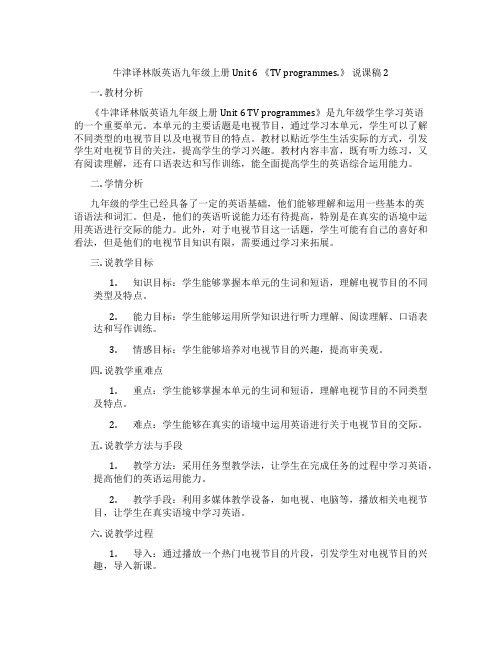
牛津译林版英语九年级上册 Unit 6 《TV programmes.》说课稿2一. 教材分析《牛津译林版英语九年级上册 Unit 6 TV programmes》是九年级学生学习英语的一个重要单元。
本单元的主要话题是电视节目,通过学习本单元,学生可以了解不同类型的电视节目以及电视节目的特点。
教材以贴近学生生活实际的方式,引发学生对电视节目的关注,提高学生的学习兴趣。
教材内容丰富,既有听力练习,又有阅读理解,还有口语表达和写作训练,能全面提高学生的英语综合运用能力。
二. 学情分析九年级的学生已经具备了一定的英语基础,他们能够理解和运用一些基本的英语语法和词汇。
但是,他们的英语听说能力还有待提高,特别是在真实的语境中运用英语进行交际的能力。
此外,对于电视节目这一话题,学生可能有自己的喜好和看法,但是他们的电视节目知识有限,需要通过学习来拓展。
三. 说教学目标1.知识目标:学生能够掌握本单元的生词和短语,理解电视节目的不同类型及特点。
2.能力目标:学生能够运用所学知识进行听力理解、阅读理解、口语表达和写作训练。
3.情感目标:学生能够培养对电视节目的兴趣,提高审美观。
四. 说教学重难点1.重点:学生能够掌握本单元的生词和短语,理解电视节目的不同类型及特点。
2.难点:学生能够在真实的语境中运用英语进行关于电视节目的交际。
五. 说教学方法与手段1.教学方法:采用任务型教学法,让学生在完成任务的过程中学习英语,提高他们的英语运用能力。
2.教学手段:利用多媒体教学设备,如电视、电脑等,播放相关电视节目,让学生在真实语境中学习英语。
六. 说教学过程1.导入:通过播放一个热门电视节目的片段,引发学生对电视节目的兴趣,导入新课。
2.呈现:展示本节课的主要内容,让学生了解本节课的学习目标。
3.practice: 通过听力练习、阅读理解、口语表达和写作训练,让学生在实践中掌握所学知识。
4.巩固:通过小组讨论,让学生分享自己对电视节目的看法,巩固所学知识。
牛津译林版英语九年级上册 Unit 6 《TV programmes.》 说课稿5

牛津译林版英语九年级上册 Unit 6 《TV programmes.》说课稿5一. 教材分析《牛津译林版英语九年级上册 Unit 6 TV programmes》是一篇关于电视节目的文章,主要介绍了不同类型的电视节目以及观看电视节目的好处。
本课内容与学生的生活息息相关,有利于激发学生的学习兴趣。
教材通过丰富的语言材料,提高了学生的英语听说读写能力,培养了学生的跨文化交际意识。
二. 学情分析九年级的学生已经具备了一定的英语基础,对于日常生活中的电视节目有所了解。
但部分学生对于电视节目的分类及特点还不够清晰,对于英语表达电视节目的词汇和句型还不够熟练。
因此,在教学过程中,需要关注学生的个体差异,针对不同学生的学习需求进行引导和帮助。
三. 说教学目标1.知识目标:让学生掌握电视节目的分类及特点,学会用英语表达电视节目的名称、类型和观看好处。
2.能力目标:提高学生的英语听说读写能力,培养学生的跨文化交际意识。
3.情感目标:培养学生热爱生活、关注社会、积极向上的生活态度。
四. 说教学重难点1.重点:电视节目的分类及特点,用英语表达电视节目的名称、类型和观看好处。
2.难点:电视节目相关词汇和句型的运用,以及对电视节目的评价和看法。
五. 说教学方法与手段1.教学方法:任务型教学法、情境教学法、合作学习法。
2.教学手段:多媒体课件、电视节目素材、图片、卡片等。
六. 说教学过程1.导入:通过谈论学生喜欢的电视节目,激发学生的学习兴趣,引出本课内容。
2.呈现:展示电视节目素材,让学生了解不同类型的电视节目及观看好处。
3.实践:分组讨论,让学生用英语表达电视节目的名称、类型和观看好处。
4.运用:通过角色扮演、小组活动等形式,让学生运用电视节目相关词汇和句型。
5.巩固:进行听力、阅读、写作等练习,巩固所学内容。
6.总结:对本课内容进行总结,引导学生关注电视节目的好处,培养良好的观看习惯。
七. 说板书设计板书设计如下:电视节目好处新闻类了解时事娱乐类放松心情教育类增长知识纪录片了解世界八. 说教学评价1.课堂参与度:观察学生在课堂上的发言、讨论和活动情况,评价学生的参与度。
九年级英语上册Unit6TVprogrammesPeriod2ReadingⅠ听写本新版牛津版-经典
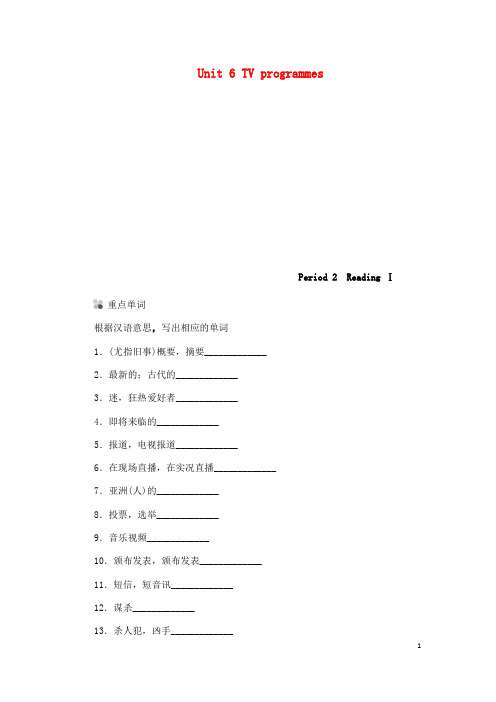
Unit 6 TV programmesPeriod 2Reading Ⅰ重点单词根据汉语意思,写出相应的单词1.(尤指旧事)概要,摘要_____________2.最新的;古代的_____________3.迷,狂热爱好者_____________4.即将来临的_____________5.报道,电视报道_____________6.在现场直播,在实况直播_____________7.亚洲(人)的_____________8.投票,选举_____________9.音乐视频_____________10.颁布发表,颁布发表_____________11.短信,短音讯_____________12.谋杀_____________13.杀人犯,凶手_____________14.恐怖_____________15.vt.导演;指点_____________16.n.导演_____________17.富有的_____________18.奥秘;疑案故事_____________19.或许,可能_____________20.害怕,恐惧_____________21.除非_____________22.喜欢动物的人_____________23.景象,风光;现场_____________24.最新的,比来的_____________25.录制,录(像),录(音) _____________根据要求,写出以下单词的变形_____________26.Asian adj.—_____________ n.27.murder n.—_____________ n.28.direct vt.—_____________ n.29.wealthy adj.—_____________n.30.latest adj.—_____________ adj. & adv.31.record v.—_____________n.—_____________ (人) n.重点短语根据汉语意思,写出相应的英文短语1.一些_____________2.现场直播_____________3.线上投票_____________4.发送音讯_____________5.免费演唱会门票_____________ 6.查明_____________7.喜欢做某事_____________ 8.近距离地观看_____________ 9.为……狩猎……_____________ 10.中缀做某事_____________ 11.最新音讯_____________ 12.发送_____________。
苏教牛津译林版初中英语九年级上册最新Unit 6 TV programmes PPT课件

Newspapers use a special style Newspaper articles
of writing. Usually the most
important information---the who, what, where, when
By:李凤玲
When you read a newspaper, you should skim the headlines first. They will tell you the topic of each title.
Newspaper headlines use the present tense. Some words are left out to save space, including a/an/the, do/does/did, the verb be and and/but/or.
5.How did she die? She died of cancer.
Homework
Preview Task on page 90.
Most important
and how---comes first in an article.
The details come next, from the most importanst important
least important ones.
Read the article on Page 89, then answer the questions.
1.Who was Susan Hunter? She was a poet.
2.What happened to her? She passed away.
苏教牛津译林版初中英语九年级上册9AU6 3
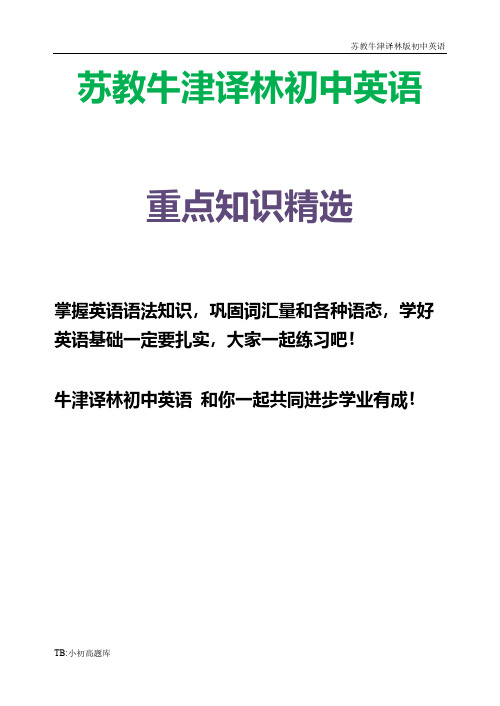
苏教牛津译林初中英语重点知识精选掌握英语语法知识,巩固词汇量和各种语态,学好英语基础一定要扎实,大家一起练习吧!牛津译林初中英语和你一起共同进步学业有成!9A Unit 6 Tv programmes第三课时导学案Reading 2使用日期______ 班级______ 姓名______ 组别______ 评价______【学习目标】1.知识目标:进一步详细和掌握与电视节目相关的词汇及词组。
2.技能目标:学会正确使用文中重要知识点及表达。
3.情感目标:鼓励学生合理利用时间去收看电视节目并能感受对学习和生活带来的快乐。
【学习重点】1. 掌握文中四会词汇以及相关的短语和句型。
2. 能灵活运用重要的语言点解决实际问题。
【基础引航】一译出并记住下列短语:1. 最新消息________________2. 近距离观看______________________3. 现场直播_______________4. 参加会议________________________5. 宣布结果__________________6. 发送短信到_____________________7. 充满_______________ 8. 容易害怕________________________9. 许多的,大量的_____________ 10. 喜欢解决疑团__________________ _11. 找到答案_________________ 12. 容易害怕______________________ __13. 停止猎杀他们___________ _ 14. 被发现死在屋子里______________【要点探究】一、完成P83 PartB4.★二. 小组合作,讨论并总结以下重要语言点的用法:1. cover有哪些含义,怎么用?2. a number of 和the number of的区分;a number of = 大量的, 后接可数名词,构成主语时谓语动词用。
苏教牛津译林版初中英语九年级上册 Unit 6 TV programmes P5当堂训练

苏教牛津译林初中英语重点知识精选掌握英语语法知识,巩固词汇量和各种语态,学好英语基础一定要扎实,大家一起练习吧!牛津译林初中英语和你一起共同进步学业有成!Unit 6 TV programmes一、词组翻译。
1.浏览标题__________________2.每篇文章主题__________________3.浓雾 _______________4.注意______________________5.重要信息________________6.世界各地的人们_____________二、词汇运用。
1. _________(make) a living, his parents are made _______(work) over 10 hours a day.2. What do you think _______(担心) him so much yesterday?3. He told me that he _____(买) me a gift if I passed the test.4. Do as you _________(tell). Don’t argue.5. Lily isn't used to_______(聊天) on the Internet.6. Britain was the first country in the world______(have) a free health system.二、单项选择。
( ) 1. The football match has just been covered ________.A. livelyB. livingC. liveD. alive( ) 2. The ___ man told us his past days before he ____. His ____ made us very sad.A . dying; died; death B. dead; dying; dieC. dead; died; dyingD. dead; dying; death( )3. ---Don't you enjoy watching the English programme on CCTV Channel 10?--_______ . I think it helpful to improve my listening and speaking abilities.A. Yes, I doB. No, I don'tC. Yes, I don'tD. No, I do( )4. Some people don’t know the value of their health _____ they lost it.A. afterB. whenC. untilD. as三、翻译句子。
- 1、下载文档前请自行甄别文档内容的完整性,平台不提供额外的编辑、内容补充、找答案等附加服务。
- 2、"仅部分预览"的文档,不可在线预览部分如存在完整性等问题,可反馈申请退款(可完整预览的文档不适用该条件!)。
- 3、如文档侵犯您的权益,请联系客服反馈,我们会尽快为您处理(人工客服工作时间:9:00-18:30)。
Task
music video news fashion cooking
drama game show sport
cartoon
Free talk
•T: What type of TV programme do you like best? zxxk
•Ss: I like …
•A: Why do you like it best?
•Ss: because it is …
•( interesting, exciting, meaningful, creative, enjoyable, cool, funny… )
Millie have entered the competition!(比赛)
Background [‘bækgraund] n. 背景
(Beginning)
The twins, Justin and Luke,Their friend Sarah lived in Hill Building.The twins from Sarah, who was asking for help.
There were some in Hill Building.were at home.received a message
burglars
'bɜ:ɡlə(r)
Story
Millie’s TV drama script
Justin and Luke at once. Then they ran there quickly.
The twins saw in police uniforms
coming out of the building with guns in their hands.
The twins were pushed into a They tried to use a to open the back
door of minibus.
knife called the police
three men minibus.
Read and answer the questions.
1. Who was the story about?
The twins, Justin and Luke.
2. Who lived in Hill building?
Their friend Sarah.
3. Why did Sarah send a message to the twins?
She was asking for help. There were some burglars in Hill Building.
4. What did the twins do at once? They called the police.
5. What did the twins see?
They saw three men in police uniforms coming out of the building with guns in their hands.
6. What happened to the twins? They were pushed into a minibus, but they tried to use a knife to open the back door of the minibus.
Millie is writing the first half the story. Help her complete it.
P90A
Millie is writing the first half of the story. Help her complete it.1. at home 2. help 3. burglars
4. police
5. ran
6. police
uniforms 7. guns 8. minibus
9. knife
Read the story loudly.
Group work:
Read the tips on partC carefully first.
My story
Classroom, copy
library, disturb
Playground, fight
Step1 Make an outline.
Background
___________________________________________
___________________________________________
___________________________________________
___________________________________________
Story
___________________________________________
___________________________________________
___________________________________________
___________________________________________
___________________________________________
Choose any one of the pictures and create your own story
with your partners. (Try your best to imagine as much as possible.)
Use your imagination to write a complete story according to the outline.
Tip : background/beginning
P2: main body/story
P3: ending
My story P1:background/beginng
P2: main body/story
P3: ending
Homework
Go on with your story if you
haven’t finished it in class and send it to my e-mail for a writing
competition.
T h a n k y o u!。
